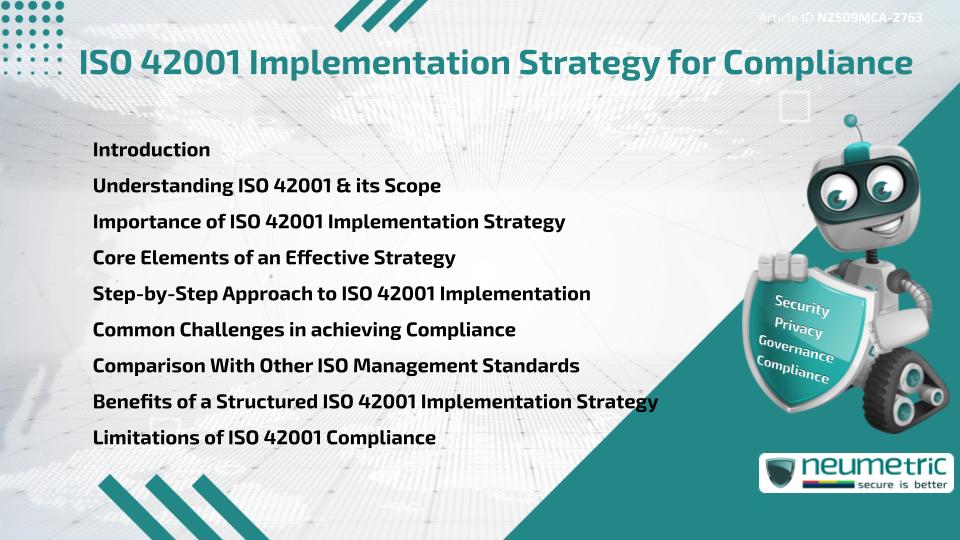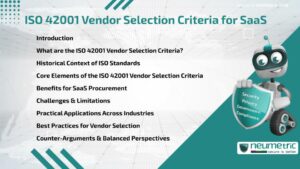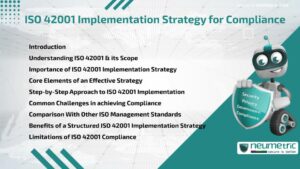Table of Contents
ToggleIntroduction
The International organisation for Standardisation [ISO] introduced ISO 42001 as the world’s first Standard specifically addressing Artificial Intelligence [AI] management systems. It provides a Framework for Organisations to develop, implement & maintain responsible AI Practices. To meet the standard’s requirements, Organisations must adopt a structured ISO 42001 Implementation Strategy. This ensures Compliance, builds Trust with Stakeholders & fosters Accountability in the use of AI Systems.
Understanding ISO 42001 & its Scope
ISO 42001 focuses on Governance, Risk Management & Transparency in AI. It is applicable to Organisations of all sizes & sectors that design, develop or use AI Systems. Unlike technical specifications, the Standard emphasises Management processes, Ethical alignment & Regulatory adherence.
Importance of ISO 42001 Implementation Strategy
Developing an ISO 42001 Implementation Strategy is critical for demonstrating Compliance & managing the Risks of AI Systems. Without a clear approach, Organisations may face Ethical lapses, Legal issues or Reputational harm. Much like Financial strategies ensure stability, an Implementation Strategy ensures AI Systems are Trustworthy, Transparent & Accountable.
Core Elements of an Effective Strategy
An effective ISO 42001 Implementation Strategy should include:
- Governance Structures: Assigning Accountability & Leadership roles.
- Risk Assessments: Identifying & mitigating AI-related Risks.
- Policy Frameworks: Establishing Ethical & Legal guidelines for AI use.
- Training & Awareness: Ensuring teams understand responsibilities.
- Continuous Improvement: Regular reviews & updates of the AI Management System.
Step-by-Step Approach to ISO 42001 Implementation
Organisations can approach Compliance through these steps:
- Gap Analysis: Compare current practices against ISO 42001 requirements.
- Planning: Define objectives, scope & resources for implementation.
- Policy Development: Draft & approve Governance & Ethical Policies.
- System Integration: Embed AI Management processes into existing systems.
- Training Programs: Educate staff on Roles & Compliance obligations.
- Monitoring & Auditing: Evaluate effectiveness through Internal Audits.
- Certification: Engage with accredited bodies for External Certification.
Common Challenges in achieving Compliance
Enterprises may face several challenges, such as:
- Complexity of AI Systems: Difficulty in mapping & assessing Risks.
- Resource Constraints: Limited budgets or expertise for implementation.
- Cultural Resistance: Resistance from teams unaccustomed to Compliance.
- Vendor Dependencies: Ensuring External Partners align with ISO 42001 requirements.
Comparison With Other ISO Management Standards
Unlike ISO/IEC 27001, which focuses on Information Security or ISO 9001, which emphasises Quality Management, ISO 42001 is unique in addressing the lifecycle of AI Systems. While it shares the Plan-Do-Check-Act [PDCA] approach with other ISO standards, it specifically integrates ethical considerations & Stakeholder Trust.
Benefits of a Structured ISO 42001 Implementation Strategy
Adopting an ISO 42001 Implementation Strategy delivers clear benefits:
- Strengthened trust among Customers, Regulators & Partners.
- Reduced Risks of Ethical or Regulatory breaches.
- Improved Governance & Oversight of AI Systems.
- Alignment with international Best Practices.
- Competitive advantage through responsible AI adoption.
Limitations of ISO 42001 Compliance
While highly valuable, ISO 42001 Compliance is not a guarantee of flawless AI Governance. Certification requires Time, Expertise & Financial resources. Moreover, Compliance provides assurance at a given time but must be continuously updated to address evolving Technologies & Regulations.
Conclusion
An ISO 42001 Implementation Strategy is essential for Organisations adopting AI Systems responsibly. By following a structured approach, enterprises can ensure Compliance, build Stakeholder Confidence & create Resilient Governance systems for AI.
Takeaways
- ISO 42001 establishes the first AI-specific management system standard.
- A strong Implementation Strategy ensures Compliance & Trust.
- Steps include Gap Analysis, Policy development, Integration & Certification.
- Challenges exist but can be mitigated with planning & training.
- Benefits outweigh limitations, offering trust & competitive advantage.
FAQ
What is ISO 42001?
It is the first ISO Standard for AI Management Systems, focusing on Governance, Risk & Compliance.
Why is an ISO 42001 Implementation Strategy important?
It ensures Organisations meet Compliance Requirements, reduce Risks & build Trust in AI Systems.
Who should implement ISO 42001?
Any organisation designing, developing or using AI Systems should implement it, regardless of size or industry.
What are the steps in implementing ISO 42001?
They include Gap Analysis, Planning, Policy development, Integration, training, Auditing & Certification.
Does ISO 42001 Certification guarantee AI Systems are Risk-free?
No, it reduces Risks but does not eliminate them. Continuous Monitoring is necessary.
How is ISO 42001 different from ISO 27001?
ISO 27001 addresses Information Security, while ISO 42001 focuses on AI Governance & Ethics.
How long does it take to implement ISO 42001?
The timeline varies but may take several months to over a year depending on organisational complexity.
Need help for Security, Privacy, Governance & VAPT?
Neumetric provides organisations the necessary help to achieve their Cybersecurity, Compliance, Governance, Privacy, Certifications & Pentesting needs.
Organisations & Businesses, specifically those which provide SaaS & AI Solutions in the Fintech, BFSI & other regulated sectors, usually need a Cybersecurity Partner for meeting & maintaining the ongoing Security & Privacy needs & requirements of their Enterprise Clients & Privacy conscious Customers.
SOC 2, ISO 27001, ISO 42001, NIST, HIPAA, HECVAT, EU GDPR are some of the Frameworks that are served by Fusion – a SaaS, multimodular, multitenant, centralised, automated, Cybersecurity & Compliance Management system.
Neumetric also provides Expert Services for technical security which covers VAPT for Web Applications, APIs, iOS & Android Mobile Apps, Security Testing for AWS & other Cloud Environments & Cloud Infrastructure & other similar scopes.
Reach out to us by Email or filling out the Contact Form…





